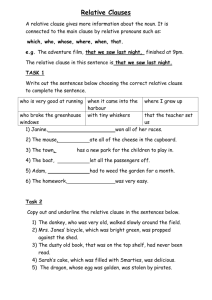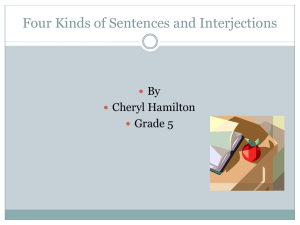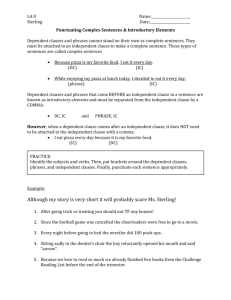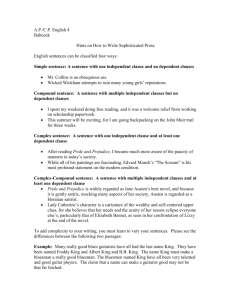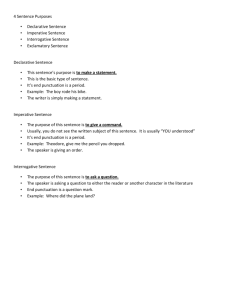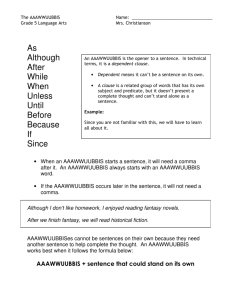Sentence Types - St. Louise School
advertisement
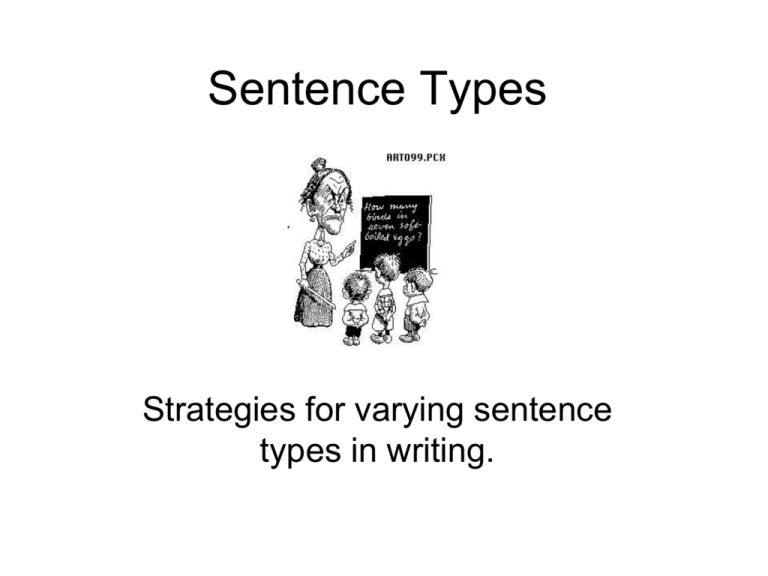
Sentence Types Strategies for varying sentence types in writing. Some Definitions What is a clause? A clause is a group of related words containing a subject and verb. Independent vs. Dependent • An independent clause (main clause) is a group of words that contains a subject and verb and expresses a complete thought. An independent clause can be a sentence. Jim should study for his chemistry quiz • A dependent (subordinate) clause is a group of words that contains a subject and verb but does not express a complete thought. When Jim studied for his chemistry quiz Quiz • Which of the following are dependent clauses? Which are independent clauses? So they left for home. She washed their car. Before the trial. Because the judge was biased. The tire is flat. Simple Sentence A sentence with one independent clause and no dependent clauses. • My aunt enjoyed the hayride with you. • China's Han Dynasty marked an official recognition of Confucianism. Compound Sentence A sentence with two or more independent clauses (simple sentences) joined by a comma and coordinating conjunction (FANBOYS). • The clown frightened the little girl, and she ran off screaming. • The Freedom Riders departed on May 4, 1961, and they were determined to travel through many southern states. Complex Sentence A sentence with one independent clause and at least one dependent clause. • After Mary added up all the sales, she discovered that the lemonade stand was 32 cents short. • While all of his paintings are fascinating, Hieronymus Bosch's triptychs are the real highlight of his art. Complex-Compound Sentence A sentence with multiple independent clauses and at least one dependent clause. • With her reputation on the line, Peggy played against a fierce opponent at the Scrabble competition, and overcoming nerve-racking competition, she won the game with one well-placed word. • Catch-22 is widely regarded as Joseph Heller's best novel, and because Heller served in World War II, which the novel satirizes, the zany but savage wit of the novel packs an extra punch. Strategies for Better Writing 1. Vary the rhythm by alternating short and long sentences. Several sentences of the same length can make for bland writing. To enliven paragraphs, write sentences of different lengths. This will also allow for effective emphasis. 2. Vary sentence openings. If too many sentences start with the same word, especially "The," "It," "This," or "I," prose can grow tedious for readers, so changing opening words and phrases can be refreshing. Notice that different beginnings can alter not only the structure but also the emphasis of the sentence. They may also require rephrasing in sentences before or after this one, meaning that one change could lead to an abundance of sentence variety. Vary the rhythm by alternating short and long sentences. • Example: The Winslow family visited Canada and Alaska last summer to find some native American art. In Anchorage stores they found some excellent examples of soapstone carvings. But they couldn't find a dealer selling any of the woven wall hangings they wanted. They were very disappointed when they left Anchorage emptyhanded. Revision: The Winslow family visited Canada and Alaska last summer to find some native American art, such as soapstone carvings and wall hangings. Anchorage stores had many soapstone items available. Still, they were disappointed to learn that wall hangings, which they had especially wanted, were difficult to find. Sadly, they left empty-handed. Vary sentence beginnings. Example: The biggest coincidence that day happened when David and I ended up sitting next to each other at the Super Bowl. Possible Revisions: • Coincidentally, David and I ended up sitting right next to each other at the Super Bowl. • In an amazing coincidence, David and I ended up sitting next to each other at the Super Bowl. • Sitting next to David at the Super Bowl was a tremendous coincidence. • But the biggest coincidence that day happened when David and I ended up sitting next to each other at the Super Bowl. Declarative Sentence A declarative sentence makes a statement. A declarative sentence ends with a period. The house will be built on a hill. Interrogative Sentence An interrogative sentence asks a question. An interrogative sentence ends with a question mark. How did you find the card? Exclamatory Sentence An exclamatory sentence shows strong feeling. An exclamatory sentence ends with an exclamation mark. The monster is attacking! Imperative Sentence An imperative sentence gives a command. Cheryl, try the other door. Sometimes the subject of an imperative sentence (you) is understood. Look in the closet. (You, look in the closet.) Quiz Identify the kind of sentence. 1. Why do you believe that? Interrogative 2. I want to know why you believe that. declarative (This is not a question.) 3. Please accept my apology. 4. Your face is frightening the baby! 5. My shoe is on fire! 6. When did you first notice that your shoe was on fire? 7. My doctor told me to take these vitamins. More Quiz 8. Ask Doris for the recipe. 9. Did you solve the puzzle yet? 10. Ann, hand me your coat. 11. It’s hard to believe that this paper is made from wood. 12. There are more apples in the refrigerator. 13. We’re on the wrong planet! 14. Will Patricia pause to place poached pickles on Paula’s pretty plate? 15. I would send her a gift if I were you. 16. Send her a nice gift.
